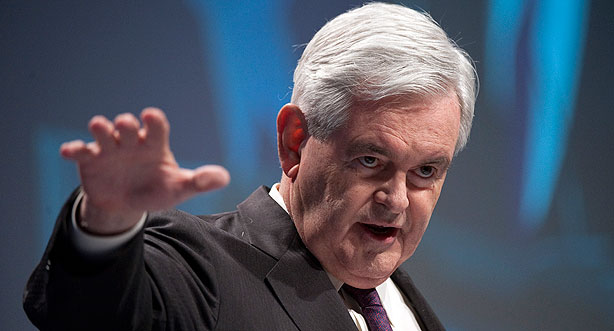Newt is Confused by Democracy

Newt Gingrich believes in much more democracy than the founding fathers.
They believed the U.S. House should consist of representatives elected by white male property owners. Voting at the time was a public act. On election day the voters would show up at a public place, usually a county seat, where food and copious amounts of alcohol were shared, and raise their hands when the name of their candidate was announced. U.S. Senators were chosen by the state legislatures for six year terms to insulate them from public opinion. The people were not trusted to elect the President and Vice President. An electoral college stood between them.
Things have evolved considerably toward more direct democracy, but not nearly as much as Gingrich would like. Reading his 21sup>st Century Contract with America< is an incredibly frustrating task if you want to know what a President Gingrich would do. It’s replete with demands for drastic change, like abolishing the National Labor Relations Board, the federal tribunal for resolving most labor-management disputes. But what replaces it is an open question. He favors a “new common sense organization.” Like what? To me common sense says labor law should guided by principles of economics so unions cannot cartelize the price of labor. I doubt that many readers of this site agree. Their “common sense” and mine often diverge.
This underscores the soundness of representative government. In a nation of 300 million people, we can’t make decisions by plebiscite or “common sense” because most people don’t know enough about any subject to make public policy. We elect representatives to study matters, listen to what people have to say, but ultimately apply their own notions of what’s in the public interest.
Gingrich is always brimming with ideas about what is right and wrong on TV, in his books and speeches. Yet given his decades in Washington, he is deliberately coy about expressing those ideas now in his presidential campaign. Either this is a display of faux humility, or he is making a deliberate attempt to conceal controversial beliefs until after the election. I can eliminate the first possibility. A close reading of his campaign manifesto reveals a desire to redraw the separation of powers.
Gingrich is convinced most federal judges are unaware of the true meaning of the Constitution, particularly the establishment clause, which has been interpreted as requiring a separation of church and state. His solution: strip the federal courts of their jurisdiction over the entire subject, and possibly others. Gingrich says he would “have a national conversation about a bill that will establish a constitutional framework for reigning in lawless judges…” By “lawless” he means judges who disagree with his views. And just what are his views of the establishment clause of the Constitution?
He says he agrees with the true Jefferson, not the one who has been “misquoted” by historians for the last century. According to this view, Jefferson never used the phrase “wall of separation.” In fact, he meant something entirely different. What did Jefferson really believe? Gingrich does not say. And more importantly, why does Gingrich believe Jefferson’s secret views should govern now rather than the outcome of the “national conversation?” He does not say that either.
Trying to understand this man gives me a case of intellectual whiplash. But I can draw a few conclusions: 1)Gingrich is a big, but not a serious thinker. He identifies a problems but not solutions; 2) Gingrich does not have the courage of his convictions. He will not talk about his proposal to reduce the corporate tax rate from 35% to 15% but prefers to retreat to identifying a problem, and offering nothing more than “a national conversation” to solve it; 3) Gingrich knows far less about the Constitution than he purports to know. And for someone who purports to respect the original ideas of the founders, his views of how the federal government should function are blasphemous.

